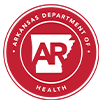The U.S. Department of Health and Human Services (HHS) issued a July 11 news release highlighting the efforts of 10 state health information exchange (HIE) programs that have set up infrastructure to enable the exchange of health information among providers caring for patients who are displaced from their homes in natural disasters. SHARE is currently building an interstate Direct connection that will allow Arkansas to connect with the 10 states that have already announced their partnership in the HHS program.
See the news release below.
States prepare for seamless exchange of health records after disasters
Ten state HIE programs have established infrastructure for secure exchange of health information
As part of an effort to help make sure their residents’ health information is available after a hurricane or other wide-spread disaster, four Gulf states have partnered with six states in the East and Midwest to help patients and providers access critical health information when they are unable to visit their regular doctors or hospitals.
Working with the Department of Health and Human Services Office of the National Coordinator for Health IT (ONC), health information exchange (HIE) programs in Alabama, Georgia, Louisiana, Florida, South Carolina, North Carolina, Virginia, Michigan, Wisconsin, and West Virginia today announced their partnership to allow for the exchange of health information among providers caring for patients who are displaced from their homes.
All of the state HIE programs participating in the initiative currently have established at least one operational interstate connection and are working with other states including Arkansas and Mississippi. The 10-state initiative is being made possible through information technology infrastructure provided through Direct. Direct is a tool developed by an ONC-led collaboration with broad health information technology (IT) industry participation that allows for the secure exchange of health information over the Internet.
“Through disasters like Hurricane Katrina and Hurricane Sandy and large tornadoes in Alabama and Joplin, Missouri, in 2011 and more recently in Moore, Oklahoma, we have learned the importance of protecting patients’ health records through electronic tools like health information exchanges,” said Farzad Mostashari, M.D., national coordinator for health IT. “Patients are better off when states and health information exchange organizations work together to ensure that health information can follow patients when they need it the most.”
A guidebook, published by the Agency for Healthcare Research and Quality, can also help primary care clinicians connect their patients’ electronic health records to a local HIE hub and regional health information organizations. The guide, Regional Health e-Decisions: A Guide to Connect Health Information Exchange in Primary Care, is available at www.healthit.ahrq.gov/RegionalHealtheDecisionsGuide.pdf.
The Southeast Regional Health IT and Health Information Exchange Collaboration (SERCH) is leading the collaborative effort. SERCH was funded through ONC’s State Health Policy Consortium and its members include Alabama, Arkansas, Louisiana, Georgia, Mississippi, North Carolina, South Carolina, Kentucky, Tennessee, and Virginia. Since SERCH began in April 2010, similar collaborations, using a variety of methods, have helped to resolve cross-border barriers toward facilitating the multi-state exchange of health information.
In 2012, SERCH completed an analysis of barriers to health information exchange and issued recommendations for developing HIE infrastructure to support disaster preparedness and response. In their final report, SERCH recommended a phased approach to use existing data sources such as health plans and state agencies to overcome barriers to HIE across states. The report can be found at http://www.healthit.gov/sites/default/files/pdf/SERCH-White-Paper.pdf
“The SERCH effort will enable health care providers to contact a patient’s health plans and available health care providers for information about the patient’s medical history when it is most needed,” said Nicole Lurie, M.D., assistant secretary for Preparedness and Response. “But patients can help protect their own information and that of their children by saving it electronically.”
Photo courtesy of NOAA.


